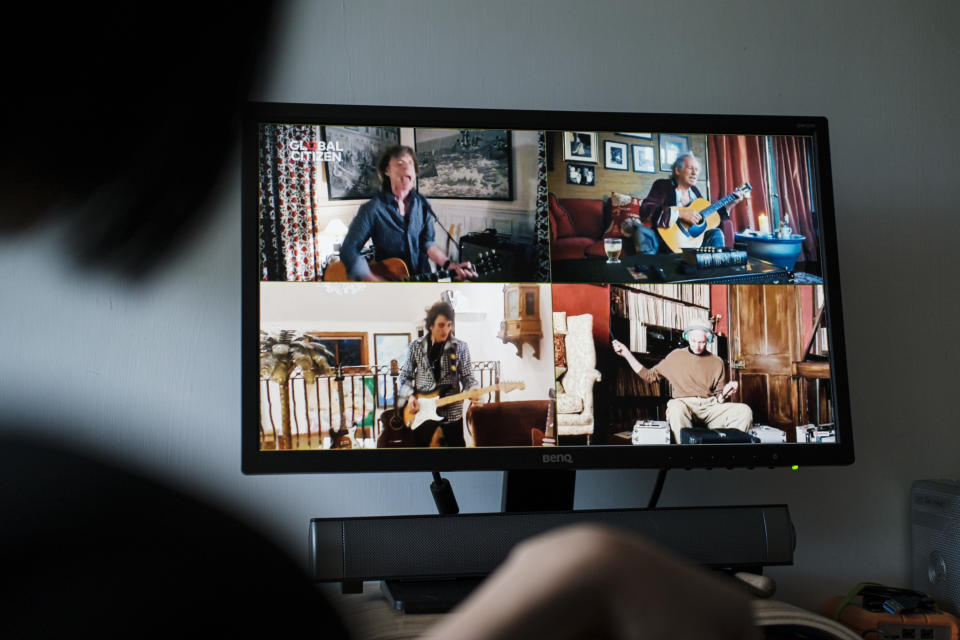Canadians are relying on music to cope with the COVID-19 blues, survey finds

Earlier on in the COVID-19 pandemic, videos of people in Italy singing from their balconies quickly went viral and were copied around the world as a sign of support during the health crisis. Now a new survey from Abacus Data, commissioned by Music Canada, indicates music has played an important role in how Canadians are coping with COVID-19.
The online poll, conducted with 2,500 Canadians from Apr. 24 to Apr. 30, found 78 per cent of Canadians are listening to music as a way to relieve stress during this health crisis.
“The COVID-19 pandemic has caused widespread worry, anxiety, and loneliness for millions of Canadians who are stuck at home and isolated from their loved ones and their usual activities,” a statement from David Coletto, CEO of Abacus Data reads. “During this period, music has been a source of comfort and discovery for many.”
A total of 35 per cent of respondents are listening to more music than before the pandemic started, and 31 per cent are watching both more video content from musicians online and more music videos than before.
The poll found 55 per cent of Canadians have discovered new content online about music and musicians they love, and 43 per cent have found new music artists.
Canadians won’t feel comfortable at live events until there is a vaccine
While listening to music is bringing comfort to some, many Canadians are really missing the experience of a live concert or other music event.
As COVID-19 spread around the world, public health measures related to limits on mass gatherings were implemented to “flatten the curve” of the virus. This saw the cancellation of stadium concert tours from massive international artists, summer music festivals and even the closure of small, local live music venues.
For “live music lovers,” defined as “those who regularly attend live music concerts or events pre-pandemic,” 58 per cent of them say the cancellation of live music events has made them feel worse about the COVID-19 pandemic. This is 34 percentage points higher than other Canadians.

While people may be missing that live music experience, the poll also found about 40 per cent of Canadians will not be comfortable attending a variety of in-person events for at least six months, or longer.
A total of 41 per cent of Canadians said it would take six months to feel comfortable at a concert at a small venue, while 33 percent said it would take the same amount of time to feel comfortable watching live music at a bar or pub and 24 per cent indicating they probably would never feel comfortable again.
For concerts at large venues, 43 per cent said it would take six months or longer to feel comfortable enough to attend and 26 per cent said they would probably never feel comfortable.
“Since concerns about contracting the virus and a second spike in infections linger, even if restrictions on large gatherings are lifted, it would be wrong to assume that people will return to their normal behaviours,” the statement from Abacus Data reads. “Just because people can do something, doesn’t mean they will.”
Survey respondents were also asked: “If concert venues and local bars, reduced the number of people allowed into the venue to allow for more distancing, how likely are you to go to concert if a vaccine is not found for COVID-19?”
A total of 59 per cent of Canadians would be certain or less likely do go to live music events, even if reduced occupancy measures were in place to allow for more physical distancing.
When it comes to travelling internationally for a music experience, half of Canadians would probably never feel comfortable going to a concert in the U.S. again and another 32 per cent said it would take at least six months for them to feel comfortable.
“Many are ruling it out [completely,] and for others, it may take months before they feel comfortable returning for live music events in the U.S.,” Coletto said. “This will have important implications on tourism, travel, and the live music industry in the United States.”

While Canadians have reservations about live music events, 30 per cent have watched a live music show online, and 70 per cent of those respondents are satisfied with the overall experience.
Back in March, some of the world’s biggest music artists started holding virtual concerts to entertain their fans, while practicing social distancing.
“This is a cool way to connect with people and make them feel some kind of love and intimacy and connection, even though they have to be stuck at home,” John Legend told the Associated Press after live streaming a one-hour concert on Facebook and Instagram.
Despite Canadians’ satisfaction with the digital live music experiences available, 79 per cent say this online alternative is not a replacement for the in-person experience.
“As an artist, what I’m finding I miss the most is the collaboration and connection I have onstage with my fellow musicians and that powerful, ephemeral experience that is created between artists and a live audience,” Miranda Mulholland, artist and chair of Music Canada’s Advisory Council said in a statement.
“Unfortunately, it’s clear that the pandemic will cause serious and possibly irreparable harm to Canada’s artists, the majority of whom were already living in a precarious state. We must continue to think about how we can help them through this as they’ve been here for all of us in this crisis.”

